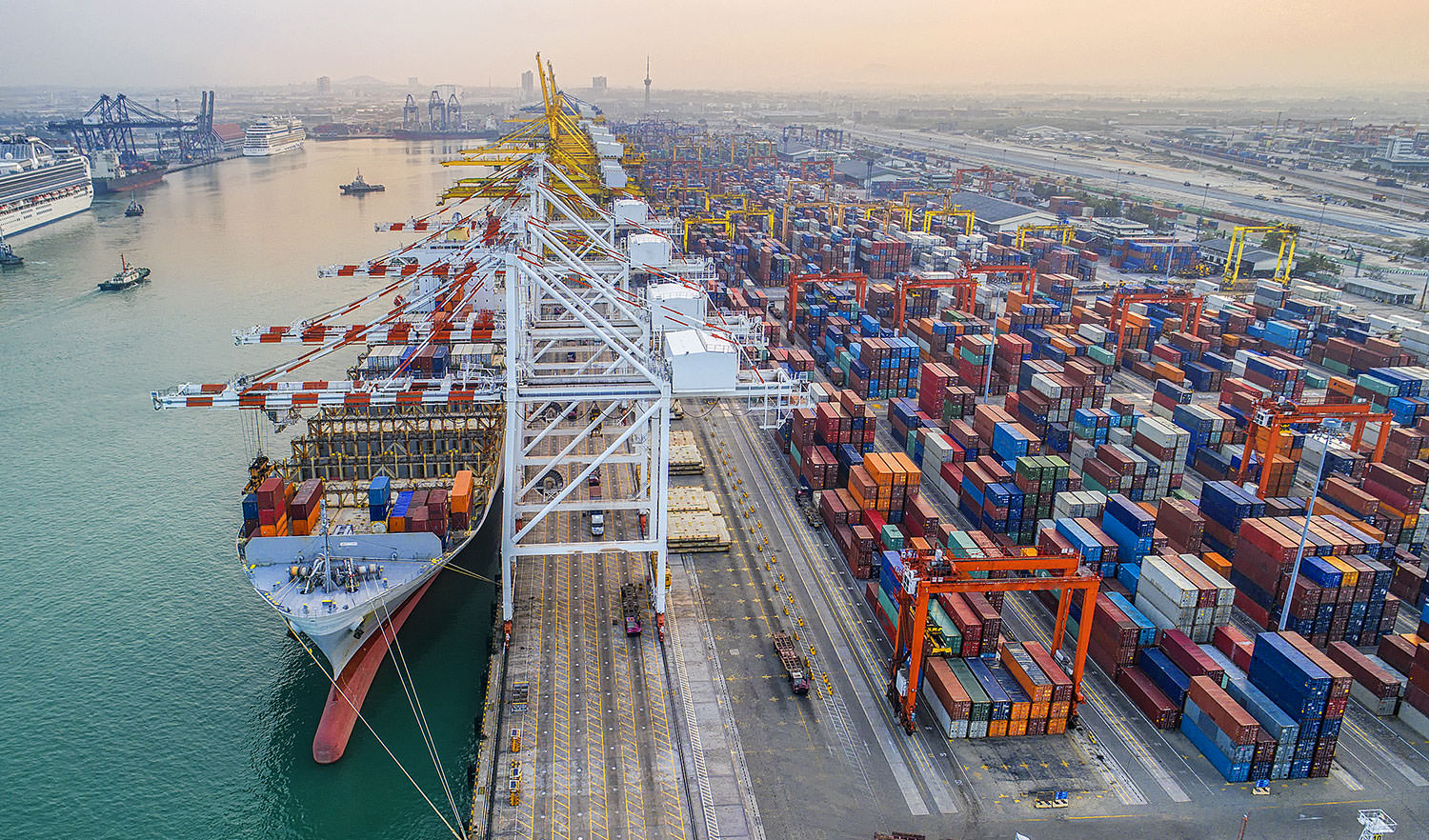Were awards given for the worst economic idea each year, Donald Trump’s call for a 10% tax on all imports would be the 2023 winner. The tax would damage the US economy as well as propagate climate change and environmental devastation.
Trump sees jobs lost to foreign trade as the economic problem facing the US. Calling himself “tariff man,” he thinks taxing imports would solve the problem. During a Fox Business News interview last August, Trump unveiled his new import tax, calling it “ring around the collar.” The expression comes from a 1970s ad for Wisk laundry detergent. The ad promised to cure a problem that didn’t exist– shirt collar stains. Trump’s import tax likewise seeks to cure a phony problem– US trade deficits.
The US did have a large trade deficit in 2023—$773 billion—the difference between US exports and US imports. But this is not bad when economies are close to full employment.
And the US economy was at full employment during 2023. Labor force participation for prime-age individuals was 83.2%, near its highest level in over two decades. US unemployment hit 3.4% in January and April– tying some months in 1969 for the lowest unemployment figure since 1953. Firms struggled to find workers, even after increasing wages (adjusted for inflation).
Our trade deficit provided the nation with goods and services produced by foreign workers. Lacking additional workers, we couldn’t produce them here. These goods also kept inflation down, as greater supply reduces prices.
The worst economic aspect of Trump’s import tax is that it would increase inflation. A tariff is a sales tax on goods coming into the US from abroad. It gets passed along to consumers in the form of higher prices. In addition, domestic firms typically raise their prices when foreign goods become more expensive; so consumers pay even more than the higher import prices due to tariffs.
Trump still complains about US trade deficits, especially with China. On CNBC’s Squawk Box in September 2016, Trump lamented that “we owe China $2 trillion… hard to believe, but that’s what it is. … They suck the blood out of us and we owe them money.”
Yes, we gave China $2 trillion in exchange for their goods over many years. But this doesn’t mean we owe China $2 trillion, just as we don’t owe US businesses $2 trillion when consumers buy $2 trillion of their goods. In return for $2 trillion of green paper with pictures of former US Presidents, we received things that we could not produce ourselves.
Even worse, President Trump’s tariffs didn’t reduce the US trade deficit. In 2016, before Trump took office, the US trade deficit (goods and services) was $481 billion. By 2020 it increased to $679 billion. For just goods, the US trade deficit hit $901 billion in 2020, up from $736 billion before he took office. The tariffs failed because other countries retaliated and firms moved to countries whose goods didn’t face higher tariffs.
Trump’s tariffs, however, did suck the blood out of US consumers. Federal Reserve economist Aaron Flaaen and his co-authors found that Trump’s tax on washing machines in 2018 raised their prices by $90 and saved 1,800 jobs. Consumers paid $815,000 for each job saved after subtracting the money collected from additional tariff revenue. A 10% import tax would do even more damage. The Tax Foundation, a conservative pro-business organization, estimates that a 10% tariff would cost every American $300 annually ($1,200 for a family of 4), and cost the US economy 500,000 jobs when other nations retaliated.
President Trump’s import taxes didn’t create jobs, didn’t lower the US trade deficit, and worsened inflation. Still, he doubles down on a failed policy. Einstein’s definition of insanity springs to mind here– “doing the same thing over and over, expecting different results.”
The environmental consequences of a 10% tariff are even more disconcerting than the economic consequences. Evidence of a climate Armageddon abounds– brutally hot summers, droughts, Biblical floods, Canadian wildfires producing orange skies across the northeastern US. And things are getting worse more quickly than scientists predicted only a few years ago.
Trump doesn’t seem to care. He brags that his energy policy is “drill, baby, drill” while mocking wind turbines because they make noise and kill birds.
Mitigating global warming requires moving quickly to renewable energy. President Biden has a reasonable plan to achieve this. Rather than increasing taxes on polluting activities to stop them, the 2022 Inflation Reduction Act provides tax benefits that incentivize good environmental behavior, such as buying an electric car or solar panels, and building wind turbines. This will reduce gas and utility costs to families, and will reduce pollution as more people drive electric vehicles and get their electricity from their own solar panels.
Doing too little has already led to environmental damage and higher inflation. Floods and wildfires have pushed up home and auto insurance rates. Droughts have reduced food supplies and increased food prices—olive oil, sugar, and coffee being notable recent examples. The heat in Texas destroyed the cotton crop in 2022, pushing up prices for clothing, cotton balls, and gauze pads. Taiwan’s drought reduced computer chip production, raising the price of goods that require these chips—everything from home appliances to smartphones to automobiles.
A 10% tariff will worsen environmental problems for two reasons.
First, Trump’s tariffs on Chinese goods cut our trade deficit with China, but production didn’t return to the US. Instead, it went to other low-wage nations, using Chinese parts. A McKinsey Global Institute report estimated that between 2017 and 2022, US imports of laptops from Vietnam rose by the same amount as Vietnam imports of laptop parts from China. Adding a step to the production process leads to more pollution as parts and raw materials move from China to Vietnam before coming to the US, and business executives traveling to more countries to inspect longer supply chains.
Similarly, firms will seek other ways around Trump’s 10% tax. Agriculture accounts for one-third of all greenhouse gas emissions, mainly due to the use of fertilizer and pesticides. A 10% tariff will encourage moving agricultural production to nations with minimal restrictions on these products, or restrictions that are not enforced. The result will be greater use of chemicals contributing to global warming.
Second, international cooperation is needed to contain climate change. If China and India continue using fossil fuels, if Brazil decimates large forests that remove CO2 from the atmosphere, the planet won’t survive—no matter what the US does.
The 2015 Paris Agreement sought to keep global temperatures within 2 degrees Celsius compared to pre-industrial times. Nations promised to make efforts to reach this goal, but the agreement lacks any enforcement mechanism, which is necessary for a successful environmental effort.
The 1987 Montreal Protocol, which sought to protect the earth’s ozone layer, shows what needs to be done. Countries promised to ban CFCs (chlorofluorocarbons). Unlike the Paris accord, trade sanctions were placed on countries that didn’t shortly phase out CFCs. Countries ratified the agreement and took action because they wanted to trade with other nations.
Unless we follow this model, there will be promises without incentives to keep them and insufficient action to save the planet. Trump’s 10% import tax would destroy the incentives countries need to fulfill their promises. With nations already engaged in a trade war due to higher tariffs, threatening a trade war is an empty threat.
Ecologically, as well as economically, Trump’s 10% tariff is deadly. The worst economic idea of 2023 is also the worst policy proposal in many decades.
Steven Pressman is a part-time professor of economics at the New School for Social Research, professor emeritus of economics and finance at Monmouth University, and author of Fifty Major Economists, 3rd edition (Routledge, 2013).




0 Comments